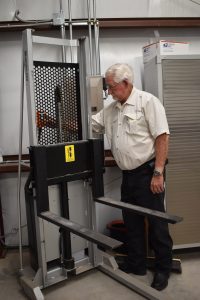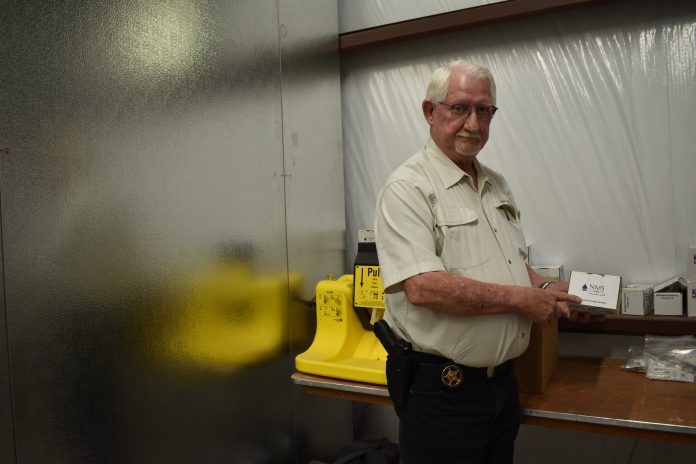The six investigators who work in the Ector County Medical Examiner’s Office no longer have to worry about running out of space.
Back in March, the county built a new building for them, complete with a cooler large enough to store up to 20 deceased people, more than quadrupling the space they used to have.
Chief investigator Ron Inge and his colleagues are responsible for investigating the deaths of people who have died alone, those who died as result of trauma or drugs and those who died in an emergency room or less than 24-hours after being transferred to a hospital floor from the ER.
Prior to the purchase of the cooler, the county was forced to rely on Medical Center Hospital, which often could only provide the county enough space for four bodies, Inge said.
“There are times where we can fill it up pretty quick. On weekends, we can work anywhere from five to 10 bodies,” Inge said.
In addition, the elevator to the hospital’s basement was often out of commission, leaving the investigators no way to get remains to the cooler, he said.
When COVID-19 hit, the county began experiencing even more issues because MCH’s cooler was always full, he said.
There were times when investigators would be in their vehicles on the way to the hospital and they’d get a call saying they were full, Inge said.

“At that time, we were depending on funeral homes out of the goodness of their heart to help us out and back at that time, they were all full so we were really, really in a tough spot,” Inge said.
If the funeral homes were full, investigators would be forced to drive to the medical examiner’s office in either Fort Worth or Lubbock, he said.
He’s grateful the county commissioners saw the wisdom of buying the building, cooler and supplies when Coronavirus Aid, Relief and Economic Security Act funds became available. They also purchased a forklift capable of lifting 1,000 pounds with a portion of the $88,500 the county set aside for the project.
“The commissioners’ court really stepped up and saw the need we had. Without them, we wouldn’t have this,” Inge said.
The investigators will now be able to handle a large fatality accident or mass shooting event should the need arise, he said. In addition, investigators now have a secure facility where they can take pictures for documentation purposes, he said.
“We do detailed case reports. It’s not just fill in the blank form. Sometimes we have three and four page narratives because we don’t want to let a body go by and just write it off as being a natural death,” Inge said. “If we have questions, even on natural deaths, if we don’t have medical records to backup some of it, no. The family will tell us they got this, they got that, but if we don’t find that all records to back that up, we send them to autopsy.”
Having the larger cooler also helps because there are sometimes cases in which someone has died while living alone and it takes investigators awhile to confirm their identity because they didn’t talk to their neighbors or have any relatives in town, Inge said. In other instances, the county has had to store people who died while visiting from outside the country for extended periods of time.
“It’s not easy to get someone out of the United States once they’ve died,” Inge said.
The county has had the cooler about a year, but couldn’t build the new building for awhile because of supply chain issues, Inge said, preferring to keep the location of the building a secret for security reasons, he said.




